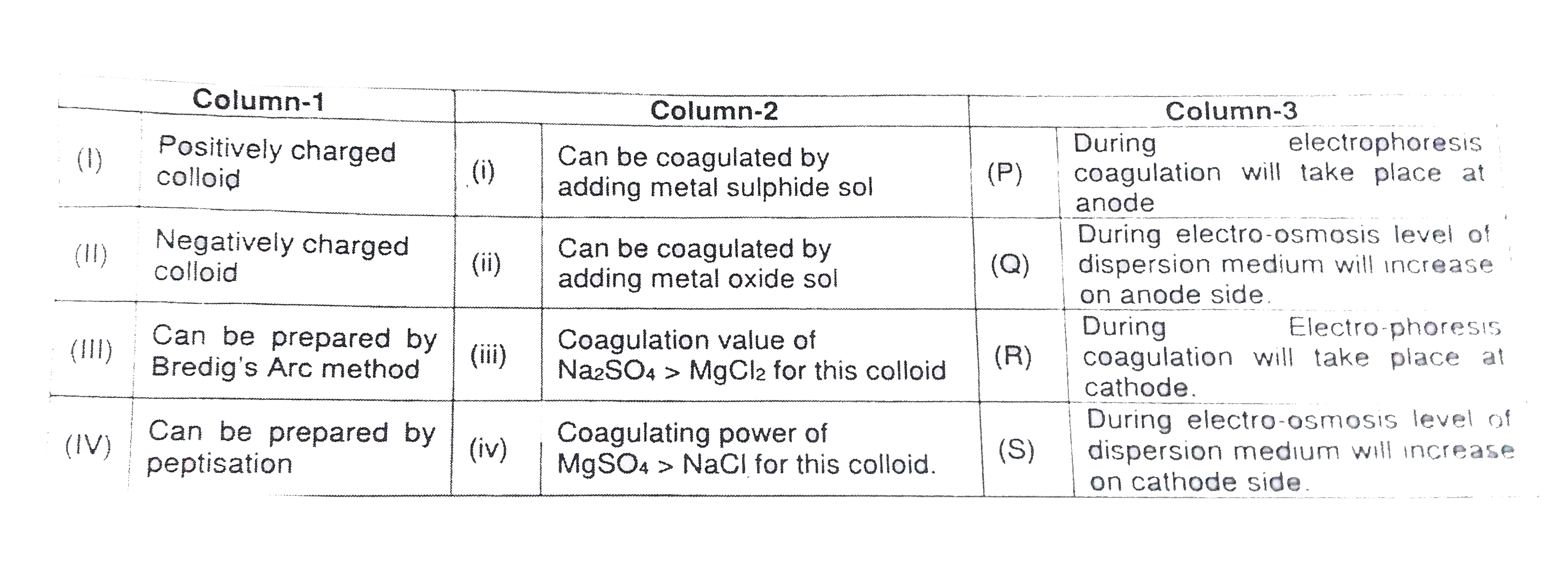Mg2+ ions is essential for selective precipitation of Fe(OH)3 by aqueous NH3.
The correct Answer is:A
To determine whether the statement "Mg^(2+) ions is essential for selective precipitation of Fe(OH)_(3) by aqueous NH_(3)" is true or false, we can analyze the situation step by step.
1. Understanding Aqueous NH3:
- Aqueous NH3 can be represented as NH4OH (ammonium hydroxide) when dissolved in water. This means that when NH3 is in solution, it acts as a weak base and can produce OH⁻ ions.
2. Dissociation of NH4OH:
- The dissociation of NH4OH in water can be written as:
NH4OH⇌NH4++OH−
- This reaction indicates that NH4OH produces hydroxide ions (OH⁻), which are necessary for the precipitation of metal hydroxides.
3. Formation of Fe(OH)3:
- Iron(III) ions (Fe³⁺) can react with hydroxide ions to form iron(III) hydroxide:
Fe3++3OH−→Fe(OH)3(s)
- This indicates that Fe(OH)3 will precipitate out of the solution when sufficient OH⁻ ions are present.
4. Role of Mg²⁺ Ions:
- Magnesium ions (Mg²⁺) can also react with hydroxide ions to form magnesium hydroxide:
Mg2++2OH−→Mg(OH)2(s)
- The solubility product (Ksp) of Fe(OH)3 is lower than that of Mg(OH)2, meaning Fe(OH)3 will precipitate out of solution before Mg(OH)2 when OH⁻ concentration is increased.
5. Selective Precipitation:
- The presence of Mg²⁺ ions can affect the precipitation process. However, the key point is that the selective precipitation of Fe(OH)3 can occur in the presence of NH4OH without the need for Mg²⁺ ions.
- The lower Ksp of Fe(OH)3 allows it to precipitate first, even if Mg²⁺ ions are present.
6. Conclusion:
- Therefore, the statement that "Mg²⁺ ions is essential for selective precipitation of Fe(OH)3 by aqueous NH3" is false. The precipitation of Fe(OH)3 can occur independently of Mg²⁺ ions due to the differences in their solubility products.
Final Answer:
The statement is false.
- Aqueous NH3 can be represented as NH4OH (ammonium hydroxide) when dissolved in water. This means that when NH3 is in solution, it acts as a weak base and can produce OH⁻ ions.
- The dissociation of NH4OH in water can be written as:
NH4OH⇌NH4++OH−
- This reaction indicates that NH4OH produces hydroxide ions (OH⁻), which are necessary for the precipitation of metal hydroxides.
- Iron(III) ions (Fe³⁺) can react with hydroxide ions to form iron(III) hydroxide:
Fe3++3OH−→Fe(OH)3(s)
- This indicates that Fe(OH)3 will precipitate out of the solution when sufficient OH⁻ ions are present.
- Magnesium ions (Mg²⁺) can also react with hydroxide ions to form magnesium hydroxide:
Mg2++2OH−→Mg(OH)2(s)
- The solubility product (Ksp) of Fe(OH)3 is lower than that of Mg(OH)2, meaning Fe(OH)3 will precipitate out of solution before Mg(OH)2 when OH⁻ concentration is increased.
- The presence of Mg²⁺ ions can affect the precipitation process. However, the key point is that the selective precipitation of Fe(OH)3 can occur in the presence of NH4OH without the need for Mg²⁺ ions.
- The lower Ksp of Fe(OH)3 allows it to precipitate first, even if Mg²⁺ ions are present.
- Therefore, the statement that "Mg²⁺ ions is essential for selective precipitation of Fe(OH)3 by aqueous NH3" is false. The precipitation of Fe(OH)3 can occur independently of Mg²⁺ ions due to the differences in their solubility products.
The statement is false.
Topper's Solved these Questions
- BOOK - CENGAGE CHEMISTRY ENGLISHCHAPTER - IONIC EQUILIBRIUMEXERCISE - Archives Multiple Correct3videos
IONIC EQUILIBRIUM
- BOOK - CENGAGE CHEMISTRY ENGLISHCHAPTER - IONIC EQUILIBRIUMEXERCISE - Archives Single Correct25videos
IONIC EQUILIBRIUM
- BOOK - CENGAGE CHEMISTRY ENGLISHCHAPTER - IONIC EQUILIBRIUMEXERCISE - Exercises Integer10videos
IONIC EQUILIBRIUM
- BOOK - CENGAGE CHEMISTRY ENGLISHCHAPTER - HYDROGEN, WATER AND HYDROGEN PEROXIDEEXERCISE - Subjective Archive (Subjective)3videos
HYDROGEN, WATER AND HYDROGEN PEROXIDE
- BOOK - CENGAGE CHEMISTRY ENGLISHCHAPTER - ISOMERISMEXERCISE - Assertion-Reasoning Type1videos
ISOMERISM
Similar Questions
The addition of ammonium chloride to a solution containing ferric and magnesium ions is essential for selective precipitation of ferric hydroxide by aqueous ammonia.
View Solution
Select the only correct option Fe(OH)3 sol.View SolutionWhy is NH4Cl essential in the precipitation of group V cations?
View SolutionConsider the following statement and select correct option:
(I) Ksp of Fe(OH)3 in aqueous solution is 3.8×10−38 at 298 K. The concentration of Fe+ will increase when [H+] ion concentration decreases.
(II) In a mixture of NH4Cl and NH4OH in water, a further amountof NH4Cl is added. The pH of the mixture will decreases.
(III) An aqueous solution of each of the following salt (NH4I,HCOOK) will be basic, acidic respectively.View SolutionWhich of the following concentration of NH+4 will be sufficient to present the precipitation of Mg(OH)2 form a solution which is 0.01 M MgCl2and 0.1MNH3(aq). Given that KspMg(OH)2=2.5×10−11 and Kb for NH3=2×10−5.
View SolutionAt 25∘C, the solubility product of Mg(OH)2 is 1.0×10−11. At which pH, will Mg2+ ions start precipitating in the form of Mg(OH)2 from a solution of 0.001MMg2+ ions ?
View SolutionA 50mL sample of hard water containing Ca2+ and Mg2+ ions is titrated with 50mL.0.005MEDTA solution at pH=10, using eriochrome balck−T indicator to reach equivalence point.
In a equal amount of hard water sample, Mg2+ ions are precipitated as Mg(OH)2 by adding suitable amount of NaOH. the solution, after precipitation of Mg(OH)2, is stirred and then titrated with EDTA solution using calcon as indicator, and it requires 10mL of above EDTA solution to reach equivalence point.
a. Calculate the strength of Ca2+ and Mg2+ ions present in hard water.
b. Calculate the hardness due to Ca2+ ions in p p m of CaCO3.
c. Calculate the hardness due to Mg2+ ions in p p m of CaCO3.
d. Calculate the total hardness of water in p p m of CaCO3.View SolutionStatement-1 :Addition of NH4OH to an aqueous solution of BaCl2 in presence of NH4Cl(excess) precipitates Ba(OH)2.
Statement-2:Ba(OH)2 is water soluble.View SolutionAssertion (A): Addtion of NH4OH to an aqueous solution of BaCl2 in the presence of excess of NH4Cl precipitates Ba(OH)2.
Reason (R ): Ba(OH)2 is insoluble in water.View SolutionThe compound insoluble in aqueous NH3 is
View Solution
